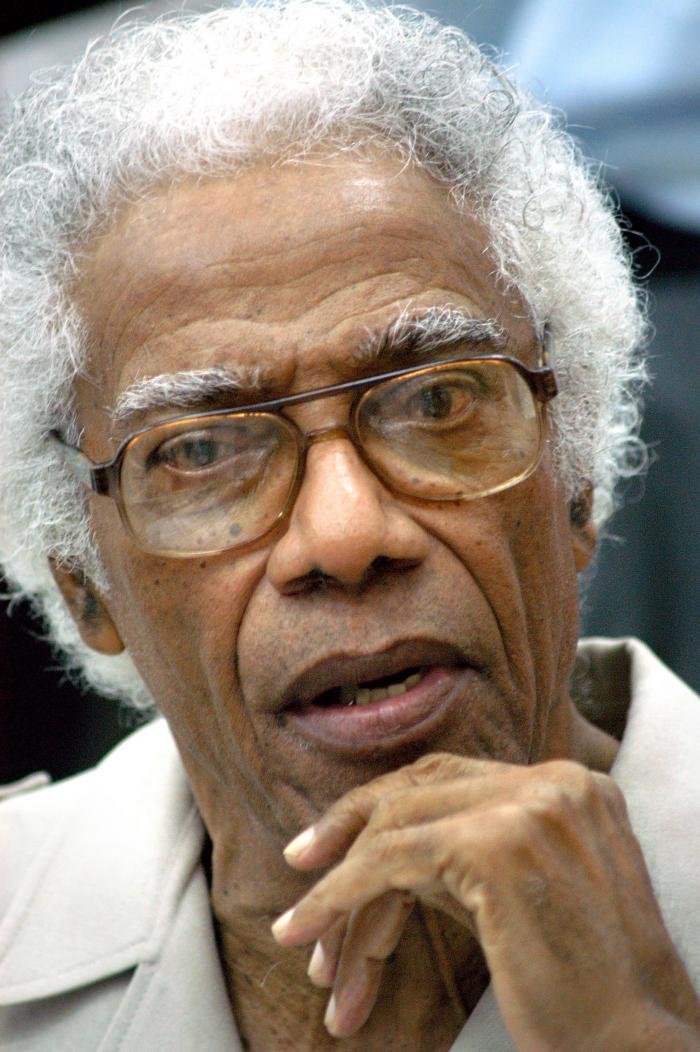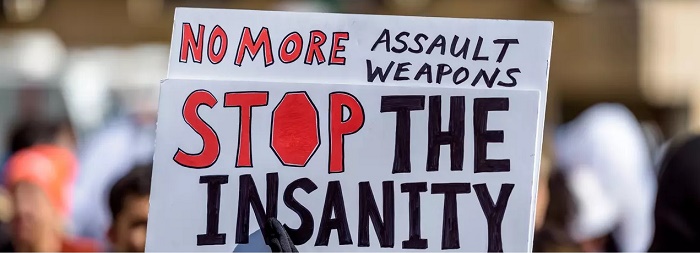June 15, 2022 2
Nancy Morejón: Regarding George Lamming

Regarding George Lamming
Translated and edited by Walter Lippmann for CubaNews.

George Lamming (1927-2022), the great writer, dean of the narrators and thinkers of the English-speaking Caribbean, has just died on the island of Barbados, his native land. It would seem that the torrential waters of the beginning of June wanted to put an end to his long and immense life experience and, also, to his exceptional literary production, which began with indisputable resonance in 1953, when his classic novel En el castillo de mi piel [In the Castle of My Skin] appeared, translated by María Teresa Ortega and prologued by Emilio Jorge Rodríguez, and splendidly integrated the editorial catalog of Casa de las Américas (1979), in its prestigious collection dedicated to Latin American literature, which included titles by authors such as the Brazilian Guimaraes Rosa, the Jamaican Roger Mais and the Paraguayan Augusto Roa Bastos.
In the years he served as an advisor to the Casa’s Center for Caribbean Studies, I learned from his erudition and his conscience, which went hand in hand. His sense of regional integration went beyond vested, economic or even personal interests. He was a good conversationalist, a spontaneous communicator. I once heard him say: “In the Caribbean, there is always a ship arriving or leaving. And also: “The best economists of our archipelagos are the housewives… that is to say, the humble women; I admire them, I love them because they put their ancestral magic into practice”.
Lamming belonged to a type of intellectual with a high sense of the function of literature and the arts as vehicles of communication and recognition of the plural identity that defines the multicultural character of the region. It was not by chance that he was part of the New World group that defended the right to avant-garde art, although never detached from a morality at the service of a more advanced, more independent and better world. With enormous rigor and a proverbial literary excellence, his stories, his novels, transpire the yearning for freedom and regional integration in a frank struggle against colonial oppression that, in his pages, also acquires a continental vocation that we still need to understand today.
He wrote books that we will never be able to do without again, and although fiction is the key to his literary experience, the truth is that he reflected and compiled a sum of allegories, reasonings and debates on exile that are today a school, a method and, thus, a call to the indomitable being of Caribbean people throughout all the archipelagos. London and Georgetown were put in their rightful place. That is the grace and intellectual restlessness that reigns in The Pleasures of Exile (1960), whose lesson Roberto Fernandez Retamar revered in his also classic essay Caliban (1979).
George Lamming is and will continue to be -like Wilson Harris, Vic Reid, Derek Walcott, among others, including the extraordinary musician popularly known as Mighty Sparrow- a sacred patriarch of our culture, especially when the popular is installed, by its own right, in the impassable place where the most legitimate flags of independence fly forever.
A weekend amid shootings and price hikes

A weekend amid shootings and price hikes
Things are not going well in the U.S. for the citizens who will vote in November. Pocketbooks are being ripped out, while schools, hospitals, religious institutions and even funerals are being targeted by shooters.
Author:

Juana Carrasco Martín | juana@juventudrebelde.cu
Translated and edited by Walter Lippmann for CubaNews.

Gasoline in Los Angeles. Author: Taken from Antiwar.com Published: 04/06/2022 | 09:11 pm
In Los Angeles, the host city in a few days of the Summit without the Americas, as many have labeled it because of the selective exclusion decreed by President Joseph Biden to three sovereign nations in the region, the price of fuel at a downtown gas station reached more than eight dollars a gallon and prices continued to rise throughout the United States.
Meanwhile, the price of a barrel of crude oil in the European market closed at $117.60, its highest price since March 23, and much had to do with the sanctions imposed on Russian exports due to Washington and NATO’s confrontation with the Kremlin and the war situation in Ukraine.
Crude oil costs account for just over half of the pump price, according to the U.S. Energy Information Administration. The rest of the price includes the other components of gasoline, production costs, distribution costs, overhead costs for everyone involved in production, distribution and sales, taxes and California carbon offset fees paid by refineries, City News Service said in releasing the increase that hits Americans’ pocketbooks hard.
The national average price of gasoline rose to a record high of $4.62 dollars, and it is no secret that this increase directly affects the cost of food, and a wide range of goods and services, so it has not been the only product that continues to rise.
The New York Times warned at the beginning of May that “the era of abundant cheap products could be coming to an end”, and went back to the pandemic in search of the causes. This is because, since then, the supply of goods has been severely limited and, consequently, prices have risen, with the aggravating factor that economists warn that this situation could persist, when the COVID-19 and the war in Ukraine affect international trade and inventories are difficult to fill.
Hence, inflation is affecting the global economy, practically without exception, including that of the United States which, moreover, many of whose corporations, in search of higher profits, have taken their industries to foreign territories and now ordinary Americans are paying double the consequences.

March for life against guns.Photo: Getty Images.
This rise in the cost of living is one edge of the Sword of Damocles hanging over the Democrats in the upcoming November elections, though not the only looming threat to that party. Mass shootings must be taken into account. These are much more than a problem of politicians-not public servants since they constitute an ultimatum to American society about its degradation as a nation.
The United States debates, once again and apparently with the same disappointing conclusion, how to reverse the violence that is expressed in the shootings that are leaving a trail of unfortunate deaths and, in just a week, the shootings have skyrocketed.
As of this Saturday, June 4 and so far in 2022, there have been 234 mass shootings in the United States, defined as when four or more people, not including the shooter, are injured or killed. Not a single week has gone by in 2022 without at least four mass shootings, according to Gun Violence Archive records, and at the end of May, they counted 256 people killed and 1010 injured. June began with the same criminal figures.
Saturday, June 4: Centerville, a Texas community is shaken after five members of a Houston-area family were found murdered in the Collins family cabin, a crime described as “unspeakable” that took the lives of three brothers, Carson, 16, Hudson, 11, and Waylon Collins, 18; their cousin Bryson, 11; and their grandfather Mark Collins, 66.
The killer, Gonzalo Lopez, a member of a Mafia group sentenced to two life sentences for murder in Hidalgo County and attempted capital murder in Webb County, had escaped from prison three weeks earlier. I was unable to find out what weapon was used in the crime.
More of a shock seems to be the emotional status of the U.S. citizenry. On Thursday, June 2, two separate shootings occurred in the Midwest. One in the parking lot of Cornerstone Church in Story County, Iowa, where Jonathan Lee Whitlatch, 33, shot two women in the congregation, Eden Mariah Montang, 22, and Vivian Renee Flores, 21, while a program was in progress inside the church. He then killed himself.
The other occurred in Racine, Wisconsin. Two women were shot at Graceland Cemetery Thursday afternoon during a funeral for a man who was killed by police last month. Residents heard between 20 and 30 gunshots before 2:30 p.m. as loved ones gathered to remember Da’Shontay L. King Sr. a 37-year-old Black man who was shot and killed by police after a foot chase following an attempted traffic stop on May 20, according to the Racine Journal Times. The identity of the attacker, apparently still on the run, was not released.
Gunshots and wails are still heard from the Buffalo supermarket massacres, from Robb’s Elementary School in Uvalde, and from fallen medical personnel at a Tulsa hospital. As America shudders, politicians are shaking in their boots to stand up to gun producers and their blackmailing arm, the National Rifle Association-NRA, or jingle in their pockets.
The President of the United States is waiting for Congress to decide on a proposal that barely promotes raising the age to 21 to legally purchase a gun. Hardly a band-aid for the deadly wounds caused by daily shootings, and possibly not even that will be granted by those who take refuge in the Second Amendment of the Constitution.
Shame on Biden’s words in a speech calling for the (unlikely) passage of the scrawny, rickety, flimsy reform: “I respect the culture, tradition and concerns of lawful gun owners,” and as if to cleanse himself, he added: “At the same time, the Second Amendment, like all other rights, is not absolute.”
It is very difficult to be with God and the Devil… and the voters, 97 percent of whom are in favor of some kind of limit or control on gun violence in their streets, schools, workplaces and homes, are pushing back.

You must be logged in to post a comment.